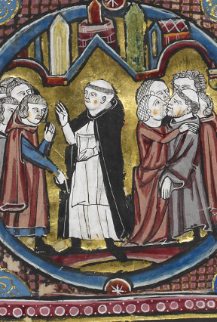From liturgy to streets. Sacred objects, society and signification in the kingdom of Galicia from 13th to 15th centuries

Monday 17 May 2021, 6.00PM
Speaker(s): Professor Xosé M. Sánchez Sánchez, National University of Distance Education in the centre of Pontevedra and Archive-Library of the Cathedral of Santiago de Compostela
Ideology, Society and Medieval Religion Seminar
Objects are the centre of the everyday life in the medieval world, with the concept of time and its rhythms. Materiality is distributed, in particular ways, between the different sectors and labours in society; different ordines in their things, in their life, in their senses. But sometimes the objects go farther materiality, hiding a layer closer to collective mentality. It is the branch that is taken for a forest; is the key that concentrates the sense of ownership. This is especially evident in relation to the Church of the 13th to 15th centuries. Here sounds, smells or objects concentrate a meaning that goes beyond the obvious, with a liturgy, sacred use and transcendence that fill them with a broad sense linked both to the sacred function and, from the feudal attributions, to the forms of political power. Such features are perfectly identifiable in the kingdom of Galicia, a territory inserted in the kingdom of Castile and Leon, and in which the wide extension of the ecclesiastical dominion provides a perfect field of study in the conjunction of cult and power. In this paper, from the provincial councils and the takeover of benefits, we will examine the significance that certain liturgical objects have taken in the forms and behaviours of daily life in the Northwest of the Iberian peninsula.
More about the Ideology, Society, and Medieval Religion: Impositions and Negotiations Seminar Series
In recent decades, medievalists have studied the ways in which people interacted with the institutional structures, practices, and theological orthodoxies of the Church, including issues such as popular belief, the lived experiences of monks and other members of religious orders, and litigation in the ecclesiastical courts.
Less well understood is how doctrine and theology shaped the behaviours and beliefs of the laity, or the middling members of a religious order or institution. We are interested in thinking about the ways in which ideology was implicated in the lives and actions of ordinary people, and the outcomes of that. How did religious ideologies influence the structuring of power relations within communities? How did individuals within religious communities internalise, personalise and negotiate the rules of their order? How did lay people contribute to the functioning of the system of ecclesiastical law? This seminar series aims to think about these questions and others, by showcasing the work of an interdisciplinary array of medievalists specialising in different religions, geographic locations, time periods, and source materials.
Location: Zoom
Email: cms-office@york.ac.uk
